The legislated law consists of the rules and sanctions to which a society agrees. But legislation may itself be immoral or moral such the facilitation of slavery Australia once engaged in or the apparent abolition of slavery. The founders of many western countries believed that emerging legislation would often require a constitution for a baseline moral imperative. It was hoped the constitution would guide the emerging politics of their fledgling nation. Centuries later the limitations of their predictive capacity of how a nation would evolve are evident. Australia’s founders, for example, would not have contemplated women’s rights to vote, or to be treated equally in private or public endeavours. Let’s face it, England was setting up an offshore penal colony much like Australia has been doing in the 21st Century to refugees, so women’s rights were not high on the agenda. The struggles of only a century ago by woman to acquire the right to vote as depicted in the current movie, “The Suffragette” remind us that political legislative reflection of societies morality can be slow to catch on. So in the 21st century, how does our legislative morality stack up on the subject of the protection of women?
When Prime Minister, Malcolm Turnbull, apparently appeared to have reversed Mr Abbott’s harsh cuts by returning $100M in funding to support domestic violence sufferers, it seemed the political morality had begun to shift. Few focused on the fact that Abbott had cut $300M in the financing of legal aid, shelters and other support services for domestic violence. In Abbott’s first fortnight in Sept 2013 he:
- dismantled a $1.5B in wage increases for 350K childcare workers (a female dominated workforce),
- appointed only one woman to his cabinet,
- announced his position as “Minister for Women” not held by a man since the 1970s – when it was created as a position,
- scrapped the Social Inclusion Board which provided guiding policy on poverty issues (suffered predominately by women).
His government’s asylum seeker record was particularly harsh on women. He started by separating a refugee mother from her newborn baby in November. After that, he hid information about the government’s treatment of asylum seekers and the sexual assault and pressuring of women for sexual favours by the guards. These failures of the duty of care were later revealed by the government’s own Moss Report after the government had disparaged Gillian Trigg’s earlier similar account. Then, the independent Immigration Health Advisory Group for asylum seekers was disbanded in December which had been actively lobbying for attention to the health needs of female asylum seekers (including dental and neonatal health and adverse health consequences of trauma such as early menopause).
Abbott also:
• suspended the Wage Connect program – despite its good outcomes for unemployed people, particularly women attempting to return to the workforce after raising children;
• converted Start-Up Scholarships to loans and increased student debt of 80,000 students by $1.2 billion, hampering those with discontinuous careers. (wherein the loan interest accruals continued even during periods of low to no wage earning when debt repayment requirements are suspended)
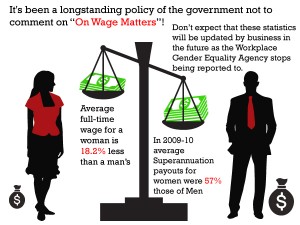
As for wage inequality, that appears to be disappearing. Apparently?! Much just like the sloganistic “Stop the Boats” policy, it was not that the inequality or boats stopped – it was just that the reporting stopped. In March Abbott removed the “red tape” which required companies to report on inequality in the workplace. In this case, silence also descended for “on wage matters“, as all private sector companies with more than 100 employees no longer had to report on gender inequality in the workplace. What isn’t measured, isn’t managed.
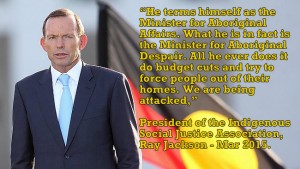
Abbott’s failures towards indigenous people are a matter of very public record, especially as once their resident Minister. (He was neither black nor female yet purportedly represented both.) When he abolished the position of Co-ordinator-General for Remote Indigenous Services he removed a position that managed dealings across a range of different government portfolios. This increased the risk that women and children’s health and safety issues would deteriorate.
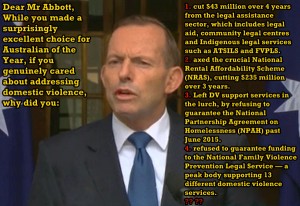
The AusAID graduate program eliminated 38 jobs when it was abolished. The program had also contained equity requirements, which promoted female graduates. When he defunded the Public Interest Advocacy Centre by $34M, it returned prioritising access to the law to those with the deepest pockets and the fattest bank balances instead of promoting public interests issues for economically disadvantaged groups, such as women. Women were also more significantly impacted by Abbott’s scrapping of the Home Energy Saver Scheme which helps women from low-income households lower their electricity bills by an average of $300 less a year. Interestingly on this point, delegating his greatest achievement as Minister for Women to throwing out climate legislation as it allegedly created a $550 a year benefit for the average family. This achievement was somewhat undercut by killing the Home Energy Saver Scheme. Aside from the fact many women thought to deal with climate mattered, for most households, the savings of $550 a year never eventuated.
Abbott also extended his reach to harm the interests of women overseas by cutting Australia’s contribution to overseas aid initially by $4.5 billion, and then even more later. These programs supported those in extreme poverty including the participation of girls in schools, micro businesses predominately run by women and interventions against domestic violence and women’s health. It is worth noting that Tanya Plibersek asked Malcolm Turnbull, “Can the Prime Minister confirm how much he will restore to the foreign aid program after the cabinet he was part of cut the budget by $11.3 billion?” He refused to answer and as yet nothing has changed.
Which leads us to the question – what has really changed now that Tony Abbott is out and Malcolm Turnbull is in?
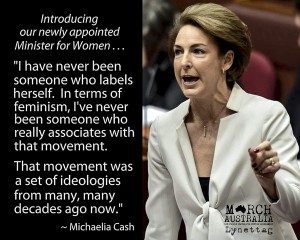
Turnbull’s first reshuffle was to introduce more women on the Government’s front bench, although this flies in the face of his record on appointing women to boards and the small numbers of women in his previous shadow cabinet. So is this a renewed genuine interest in women or a politically strategic face saving? Which ever this is, is increasing the numbers of women in politics a major women’s issue? I am not sure the current female incumbent is doing anything of a better job. Instead, women are more likely to be seeking representation that results in being considered with equity and fairness in society, finance, politics and leadership. The distinction therein does matter!
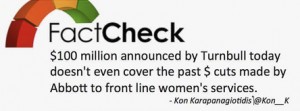
In relation to Malcolm’s $100M domestic violence funding support (always keeping in mind Abbott took $300M), the most generous comments by women support group representatives is: “It’s a great start…”. The reference to “start” pre-presumes there is more to come. Everyone who can read the list of items being funded realises that it’s not refunding anything Abbott cut. It is not refunding the women’s shelters Mr Abbott closed. The crippling of Community Legal aid was hardly positive news for women. Abbott’s wavering on defunding, then reneging, only to propose defunding later on, of Legal support entities resulted in many closures. There were few (possibly no) women’s groups desperately asking for phones, locks or security cameras and yet, that was what was offered.

Interestingly, the Turnbull government’s latest private health insurance survey is exploring allowing private health funds to discriminate against people on the basis of age, gender or health status. Already the items removed from the Medicare Benefits Scheme target children’s surgeries and the removal of Pap smears, blood tests, urine tests and imaging services that will have a direct impact on Women’s health issues, not to mention the plan to phase out Family Tax Benefit (FTB) payments to the tune of $260.4 million in budget cuts. In addition, the government has decided to:
- make cuts of $441.0 million to reduce the Child Care Subsidy,
- cap the number of places in the Interim Home Based Carer Subsidy program,
- remove the access to the affordability support element under the Community Child Care Fund, and
- slash $930.6 million so that family day care educators can not receive Commonwealth child care fee assistance for family day care sessions provided to their children on the same day that they provide family day care to other children.
(This last point is taken almost verbatim from the December Budget papers.) Flexible, high quality & affordable childcare is essential to balance work and parenting responsibilities. The government is not only making it less affordable but is not addressing access to childcare. A recent report demonstrated that childcare centres in the city couldn’t cope with the demand by families, undermining the ability of women to return to work. Why are we engaging in this penny pinching from women and children when there are billions in subsidies to mining, elite schools, private health insurers? Changing the tax laws to stop tax avoidance by companies would earn billions more than what is being cut. How can anyone suggest these cuts don’t represent a discriminatory bias?
Surely though, there is a voice for women in the Government that will be heard on issues of sex discrimination? Is that not the role of the Sex Discrimination Commissioner? It would if the role was filled appropriately. The last commissioner, Elizabeth Broderick, left the post in early September before Tony Abbott was replaced by Malcolm Turnbull. While Gillian Triggs was assigned to act in that role temporarily, being onlyno full-time replacement has been announced under Mr Turnbull’s leadership, despite many questions as to why. Many will be aware of how responsive this government has been to Gillian Trigg’s in her primary portfolio, so one can expect her to receive the same response in her part-time job. Perhaps overburdening her is part of a strategy.
For a government that expresses such concern for women’s issues, what sort of legislative morality is Mr Turnbull exhibiting? Certainly not one that has changed anything significant in policy or legislation that Abbott initiated. When I say “anything significant”, I am making a concession for DV support, being only one-third of the funding preciously cut. The question should be though, how significant was that concession? Given the domestic violence refunding added new and mostly unlobbied for support for our current death toll of two women a week, but revoked none of the cuts Abbott made, does this constitute a significant legislative change in support of women? Should it more appropriately be seen as a cynically manipulative change to elicit applause from women because it was apparently differentiated from Abbott’s moral compass? If the legislation and policies of politics have remained predominately unchanged in direction since Abbott left, what is the direction of moral compass exhibited overall by legislative and strategic direction of this government in regards the women of Australia?